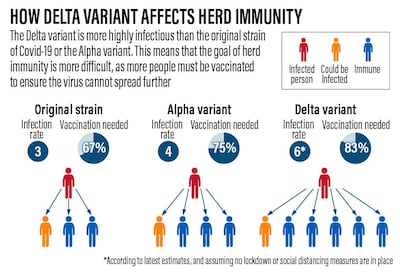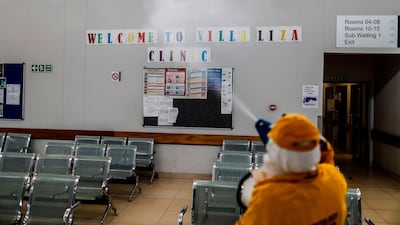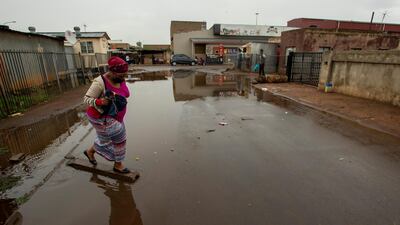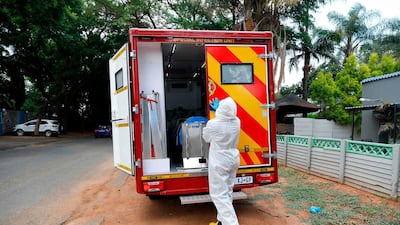New Sars-CoV-2 variants pose a serious threat to people unvaccinated against Covid-19, UAE authorities have said.
Dr Farida Al Hosani, spokeswoman for the state health sector, said those who have not been inoculated are at high risk of catching the virus, with strains more lethal and contagious than the original.
But why is the coronavirus getting worse?
Wasn’t Covid-19 supposed to get weaker over time?
Many assumed it would.
But that view is wrong, according to experts.
“Whilst some scientists may believe [it will become less severe], those who study the evolution of virulence (disease severity) generally don’t,” tweeted Katrina Lythgoe from the UK's University of Oxford.
“To say that viruses will inevitably evolve to be less severe, particularly those in a novel host like Sars-CoV-2, is simplistic at best.
“At worst, it could dangerously blinker our thinking on how best to control the virus in the short-to-medium term.”
Instead, viruses generally evolve to become more fit, which means they become more transmissible, she said.
And that is exactly what we are seeing with Sars-CoV-2.
The four most concerning variants are Alpha, Beta, Gamma and Delta.
These were previously known as the UK variant, the South African variant, the Brazilian variant and the Indian variant.
How transmissible is the Delta variant?
Delta, the variant first detected in India, is up to 60 per cent more transmissible than the one first reported in the UK, which is again more contagious than the virus that emerged in China's Wuhan.
While the original strain had an R0 of 2.5, meaning every person who caught it was likely to pass it on to two and a half people in the absence of safety measures, for the Delta variant it is believed to be as high as eight, according to Imperial College London.
And as infections increase, more people have to be taken to the hospital, irrespective of the severity of the variants.
A recent model by Imperial College London suggests the delta variant could lead to a significant third wave in the UK, similar to winter last year.
Are the variants more severe?
Delta appears to be. According to a recent Scottish study, it doubles the risk of patients needing hospital treatment compared to Alpha, which first emerged in the UK.
Doctors have seen an increase in the number of strokes, gangrene cases and necrosis – the death of body tissue – associated with the variant.
There were also reports of hearing loss and joint pain among patients affected during India’s second wave, in addition to a surge in cases of a deadly fungal infection called mucormycosis, also known as the black fungus.
How infectious could variants get?
No one knows.
Dr Aris Katzourakis, an expert in viral evolution at the University of Oxford, told the BBC it would be foolish to guess how transmissible future strains could get.
"There is still space for it to move higher," said Prof Wendy Barclay, a virologist from Imperial College London.
"Measles is between 14 and 30 [the RO] depending on who you ask, I don't know how it's going to play out."
Ms Lythgoe of Oxford University said the virus has no reason to become less virulent in the short term as it is new to people and there are still many potential hosts.
Prior immunity could make infections less severe.
And if the virus is able to mutate to become more benign while retaining its transmissibility, it could evolve to become weaker, she said.
“In the distant future, the human population itself could evolve to better tolerate infection,” tweeted Ms Lythgoe.
“But there are a huge number of uncertainties here – and we haven’t even touched on the conflict between within-host and between-host evolution."























